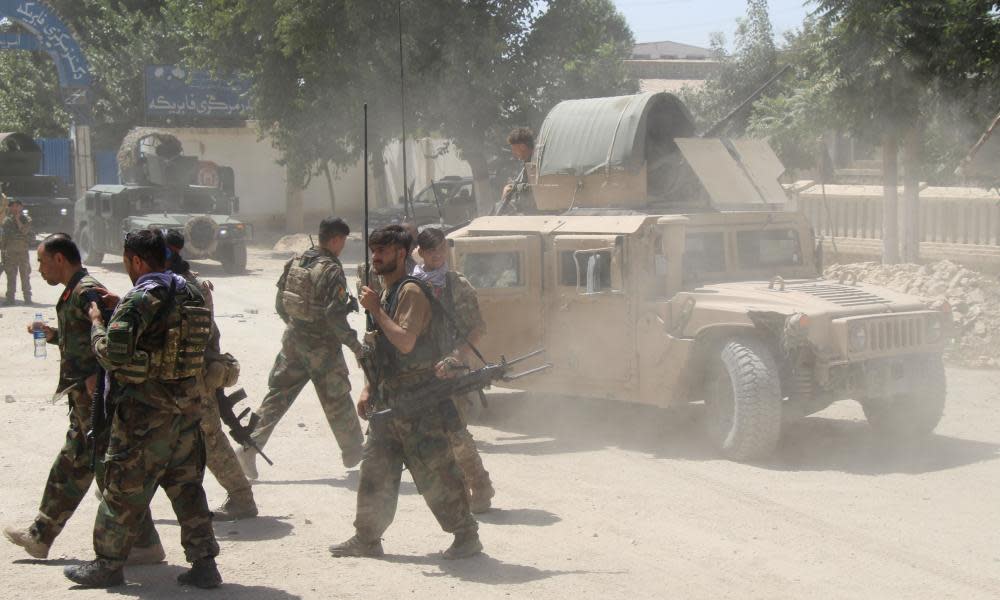Afghans who helped Australia at risk after receiving Taliban ‘night letters’, former Dfat adviser says

A former Australian foreign affairs staffer who was the target of a suicide bombing in Afghanistan after receiving Taliban “night letters” is pleading for the evacuation of his former Afghan colleagues, amid reports at least nine locally employed workers have been killed in recent days.
David Savage was sent on secondment to Afghanistan in 2011 as an AusAid stabilisation adviser in a remote and volatile province under the security mandate of an Australian-led international military force.
On 26 March 2012 the suicide bomb attack left him with 64 ball bearings and pieces of shrapnel in his body, as well as a traumatic brain injury and deep psychological scars.
Related: Afghan interpreters say Australian visa offer is not enough to get them to safety
Savage said in the lead-up to his attack he received the same Taliban threat letters his former colleagues are now getting.
He has pleaded with the Australian government to act immediately on an evacuation plan for locally engaged workers as provinces continue to fall back under Taliban control.
“The simple fact is we know that the Taliban have given these ‘night letters’ out over the years and that the Taliban have acted on them,” Savage said.
“If the government wanted to actually do a proper assessment of it there’s a lot of people that they could engage with, and I’m not aware of anyone who’s been engaged with the government.
“This has been a policy decision, but the [immigration] minister [Alex Hawke] has so much discretion, he could change that policy in a minute.”
Savage wrote to the foreign affairs minister, Marise Payne, on 10 June about a former colleague called Omar*, detailing his high level of responsibility while working on the $6m AusAID project, and expressing his “real concern” that those who assisted Australia’s mission would be killed.
The Department of Home Affairs responded by sending general information about the visa process, providing little hope for his colleague, Savage said.
“Decision-makers must consider each application against the requirements of law and policy and must be satisfied that the requirements are met before a visa is granted,” the letter said.
“COVID-19 travel restrictions currently prevent people from entering Australia unless they are an Australian citizen or permanent resident or have been granted a travel exemption.
“An exemption must be granted before arranging travel to Australia. Availability of flights remains an issue and therefore obtaining a travel exemption is no guarantee of travel to Australia.”
Another locally engaged Afghan working to guard Australia’s embassy in Kabul was shot at while driving with his wife and young son earlier this month.
The Guardian has seen photographs of the guard’s damaged car and an incident report sent to Payne and other Australian cabinet ministers soon after.
The father of three has gone into hiding as he waits for his former employer of seven years – the Australian Department of Foreign Affairs – to certify that his life is in danger because of his service, in order to progress a humanitarian visa to come to Australia.
The latest targeted attacks on Afghans working in support of Australia’s mission come amid reports that more than nine locally engaged Afghan men have been killed in recent weeks by Taliban operatives. The Guardian has seen a list of names of nine men who worked in a range of roles for Australia, but has been unable to verify the reports.
Related: ‘The first group they will kill’: why Afghan allies are terrified about Australia’s exit
Fierce fighting between the Taliban and Afghan government forces has taken place on the outskirts of three provincial capitals in the northern provinces of Faryab, Balkh and Kunduz provinces in recent days, with fears that the provisional capital of Tarin Kot will be next.
Prof John Blaxland, the former head of the strategic and defence studies centre at the Australian National University, said the government was entirely capable of responding to the situation, which has escalated since the announcement of Australia’s plans to withdraw its troops with no conditions by 11 September after nearly 20 years of conflict.
“What is unacceptable is for us to just continue with this go-slow approach, leaving them exposed, vulnerable and at huge risk,” he said.
“The prime minister has declared that we’re making this a priority issue and a lot of this can be done remotely, but some of it has to be done on the ground [in Afghanistan].
“A little bit of fancy footwork is required but our diplomats and government officials can work that out and I have every confidence with them because we’ve done this kind of thing before.”

 Yahoo Movies
Yahoo Movies 
